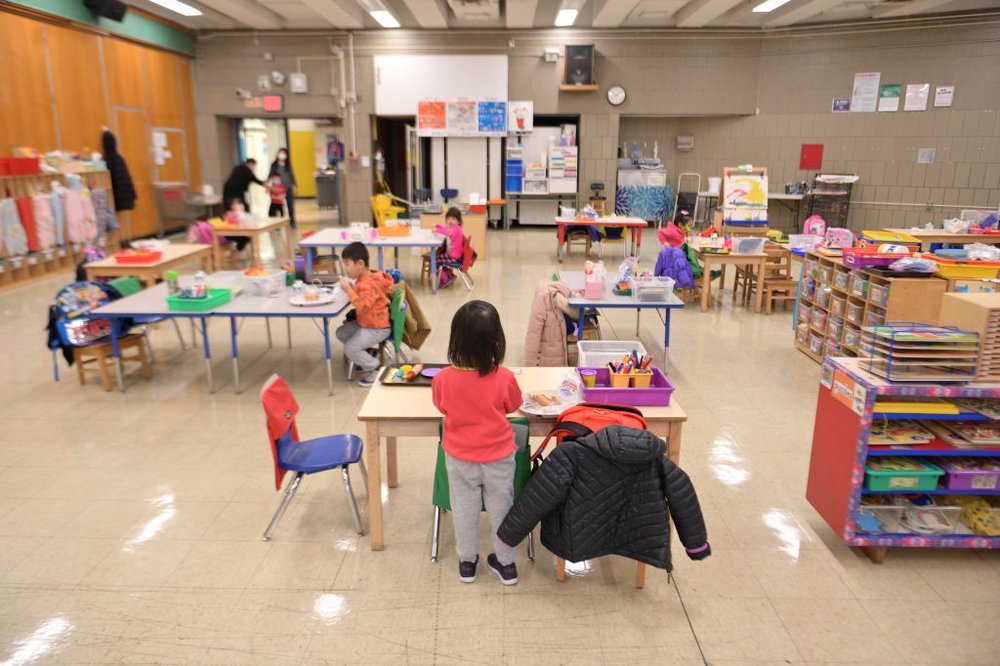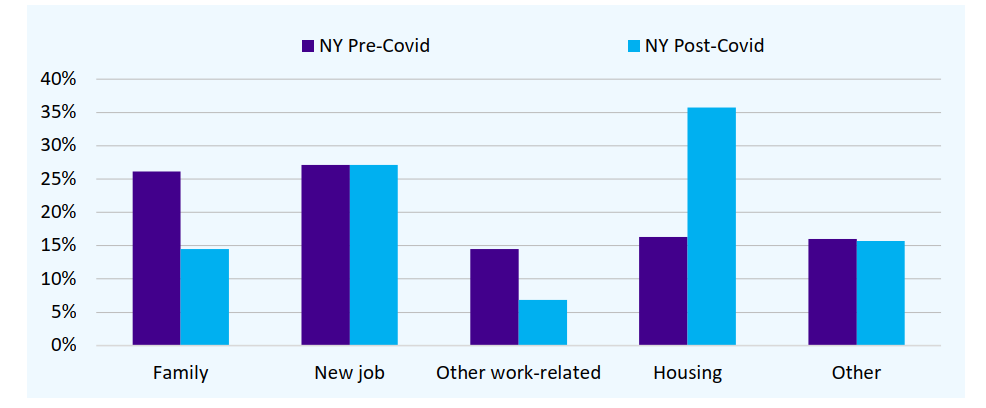Young families are fleeing NYC. Rising child care and housing costs are to blame.
June 3, 2024, 6:01 a.m.
The Fiscal Policy Institute found households with young children are twice as likely to leave the city than those without kids.

The rising cost of child care in New York City is driving families with young kids to pack up and leave the five boroughs, according to a new report set to be released on Monday.
The Fiscal Policy Institute, a left-leaning think tank, released new data showing families with children aged 6 or younger are twice as likely to move out of the city as families without young kids. Households with young children make up 14% of the city’s population but 30% of those fleeing the five boroughs, according to the group’s findings.
The analysis underscores the affordability crisis gripping New Yorkers who are caught between escalating rents, child care costs, rising food prices and inflation.
The new data comes as city officials fight an ongoing battle over proposed cuts to early childhood education programs. Education-focused nonprofits and some members of the City Council are urging Mayor Eric Adams to fully restore proposed reductions to popular programs.
Adams rolled back some of his cuts to 3-K and pre-K and has promised that any parent who wants a 3-K seat for their child will have access to one.
The exodus of city residents is fueling New York state’s overall population loss, making up 90% of the state’s total departures, according to U.S. Census data analyzed by the Fiscal Policy Institute.
“We hope that it points policymakers toward interventions that directly address a need for increased supply of housing across the full income distribution, more tenant protections, rent control, and increasing the availability and access to child care,” said Emily Eisner, an economist at the Fiscal Policy Institute and co-author of the report.
“We have universal pre-K and 3-K in the city, but we know that they've been sort of under threat and haven't been really universal yet,” Eisner said.
A spokesperson for the mayor touted several city programs and investments in child care.
"New York City’s early childhood system is the most comprehensive in the country, serving more young New Yorkers than ever before with programs like MyCity that is helping families sign up for child care online, investing billions of dollars in early child care, and shifting thousands of seats across the city to immediately meet demand and expand access for families,” City Hall spokesperson Amaris Cockfield said in a statement.
“We are committed to building on this work to make our city more livable for all New Yorkers,” Cockfield added.
Cockfield said the city has expanded access to childcare for working-class families and has a goal of building 500,000 new homes by 2032 to address the housing crisis.
But the report found that housing and the cost of raising young children are driving families to leave New York state in favor of states like Florida or New Jersey. While families with young children were more likely to leave the state before the COVID-19 pandemic, the trend has only worsened since 2020.

Now, families with young children in New York are more than 40% more likely to leave New York than those without young kids.
A March report from the Empire Center, a fiscally conservative think tank, found that New York’s population loss is slowing down, but the outflow of people leaving the five boroughs has effectively wiped out any population gains made in the decade prior to the 2020 census.
Because New York's population growth lagged behind that of other states — like Florida — it lost a seat in the House of Representatives after the last census count in 2020. New York could stand to lose even more representation in Washington if its population growth continues to slow.
The Fiscal Policy Institute data shows 36% of residents fleeing the state said they were leaving to find more affordable housing — more than double the rate of those who cited housing costs as a reason to relocate prior to the pandemic.
Brooklyn resident Michael-Alan Gu said he, his partner and 4-year-old twins are weighing whether to move out of the city because they can’t afford child care. His children were accepted into the city’s pre-K program but it only offers care until 2:30 p.m. with no after-school option.
“They're not accommodating or even giving precedence to working families who have to work an eight-hour work day,” he said. If he stays in the city, he’ll have to hire a part-time nanny or he or his husband will have to find a way to get off work early to pick up their kids.
“All we want is to be able to live in the city and to provide some type of affordability so that we can continue living in the city that we love,” he added.
I almost feel like under Mayor Adams, that he's attacking the family unit and that he doesn't want young families to thrive here
Michael-Alan Gu, a Brooklyn parent of small children.
Black and Hispanic residents are also leaving the state at higher rates than their white neighbors. That’s largely because most residents leaving the state are living in New York City, which has a higher share of Black and Hispanic residents compared to the rest of New York.
The numbers show Black residents are moving out of the state at more than 50% the rate of white residents, while Hispanic residents are 38% more likely to leave the state than their white counterparts.
“That speaks to a city that is not supportive to the whole population of the city,” Eisner said. “We see inequities in the provision of services that are making it more challenging for Black and Hispanic families to sustain life here.”
New Yorkers between 26 and 35 years old, who have options to work remotely or were born in other states, were more likely to leave overall, the report said. A previous report by the Fiscal Policy Institute also found lower- and middle-income New Yorkers are leaving at much faster rates than the wealthiest residents.
“It's hard not to love New York City when you're here, but I almost feel like under Mayor Adams, that he's attacking the family unit and that he doesn't want young families to thrive here,” Gu said.
This story was updated to include a statement from City Hall.